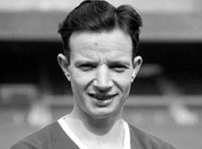|
|
|
Johnny
Berry |
Manchester United
FC
4 appearances, 0 goals
P 4 W 1 D 2 L 1 F
3:
A
3
50% successful
1952-56
captain: none
minutes played: 306 |
|
 |
|
Timeline |
| |
Reginald John Berry |
|
|
NOT John James Berry. There is no John
James Berry anywhere in any registration born in Aldershot. His
death registration in September 1994 confirms that the Berry born on 1
June 1926 was in fact, Reginald.
By way of confirmation... Johnny's footballing brother, Peter, born in
Aldershot at the end of 1933, both his and Reginald's registration both
confirm that their mother's maiden name is identical...'O'Connor'. |
|
Birth |
1 June 1926
in Aldershot, Hampshire [registered as Reginald J., in Farnham,
Surrey].
Attended St Joseph's School, Aldershot |
|
Marriage |
to Hilda D. Reeves
[registered in Aldershot, December 1948] |
|
|
According to passenger lists, John Berry left
Southampton for New York on the Queen Elizabeth, a Cunard White Star ship,
on 30 April 1952. Amongst the 1196 was the entire Manchester United FC
squad. |
|
Death |
16 September 1994 in Farnham, Surrey,
aged
68 years 107 days
[registered as Reginald J., in Surrey SW, September 1994].
Following a short illness. |
|
Source |

Douglas Lammings' An
English Football Internationalist Who's Who [1990] & |
|
Club Career |
|
Club(s) |
Played schoolboy football in Aldershot, and also played with Aldershot
YMCA. He played football in the army, where he was spotted by Birmingham
City FC and signed for them in December 1944. After 104 league
appearances and six goals, his talents were noted by Matt Busby
who paid £25,000 for him to take him to Manchester United FC in
August 1951, becoming a Busby Babe. Like many of his teammates, he was
involved in the Munich Air disaster, but unlike many of his teammates,
Berry survived, but never played football again. He had made 247
league appearances, scoring 37 goals. |
| |
His injuries in 1958 meant that he was
never able to pursue his career in football again. He took a job with
Massey Ferguson in Trafford Park but in 1960, United asked him to vacate
their club house in Davyhulme to accommodate the signing of Maurice
Setters. It was a sad state of affairs and one that made the Berry family
understandably, very bitter. The family moved back to his home town of Aldershot.
- Rednews.co.uk |
|
Club honours |
Football League Champions
1951-52, 1955-56, 1956-57; FA Cup runners-up 1956-57 |
|
Individual honours |
Football League
(one appearance) |
|
Distinctions |
Survived the
Munich Air Disaster, although it ended his football career.
Brother of
Peter Berry (Crystal Palace FC
and Ipswich Town FC 1952-61) |
|
Height/Weight |
5'
5½", 9st.
9lbs [1951]. |
|
Source |
Douglas Lammings' An English
Football Internationalist Who's Who [1990]. |
|
England Career |
|
Player number |
One of two who became 719th
players (720) to appear for England. |
|
Position(s) |
Outside-left/right |
|
First match |
No. 277, 17 May 1953,
Argentina 0 England 0,
an end-of-season tour match at
Estadio Monumental, Nuñez, Buenos Aires
- abandoned after 36 minutes, aged
26 years
350 days. |
|
Last match |
No. 304,
16 May 1956,
Sweden
0 England 0, an end-of-season tour match at Råsunda Fotbollstadion, Solna, aged
29 years 350 days. |
|
Major tournaments |
None |
|
Team honours |
None |
|
Individual honours |
England B (one
appearance, 1952) |
|
Distinctions |
The twelfth Hampshirian to represent England.
Died twelve days after Frank Broome and thirteen days after Billy Wright. |
|
 |
|
On 6th
February 1958 the airliner carrying players and backroom staff of
Manchester United, plus a number of journalists and supporters, crashed in
a blizzard on its third attempt to take off from Munich airport. United
were returning from Belgrade where they had just beaten Red Star Belgrade
in the European Cup and had stopped off at Munich for re-fuelling.
Twenty-three of the forty-four passengers on board the aircraft lost their
lives. - Munich Remembered and Never Forgotten -
Munich58.co.uk |
|
Beyond England |
|
After leaving school, he had been a
projectionist in an Aldershot cinema. And spotted playing football during
the war. After his career was curtailed, upon moving back to Aldershot, Johnny
opened a sports shop 'Berry's' with his brother Peter in Cove, where he
remained for twenty years. He then went onto work as a storeman in a
television retail warehouse. -
An English Football Internationalists' Who's Who.
Douglas Lamming (1990). Hatton Press, p.32./Rednews.co.uk |
|
The Numbers |
|
parties |
Appearances |
unused |
minutes |
 |
captain |
|
3 |
4 |
five |
306 |
0 |
none |
|
minutes are an approximation, due to the fact that many matches rarely stick to exactly ninety minutes long, allowing time for injuries and errors. |
|
P |
W |
D |
L |
F |
A |
GD |
FTS
|
CS |
FAv |
AAv |
Pts% |
W/L |
|
4 |
1 |
2 |
1 |
3 |
3 |
=0 |
2 |
2 |
0.667 |
0.667 |
50 |
=0 |
|
all matches were at an away venue, all friendly matches, and all
in a white shirt |
Match History
|
Club:
Manchester United F.C. - four
full appearances (360 min) |
manager: Walter
Winterbottom - four full appearances
(360 min)x
|
|
apps |
match |
pic |
match details |
comp |
res. |
rundown |
shirt |
|
|